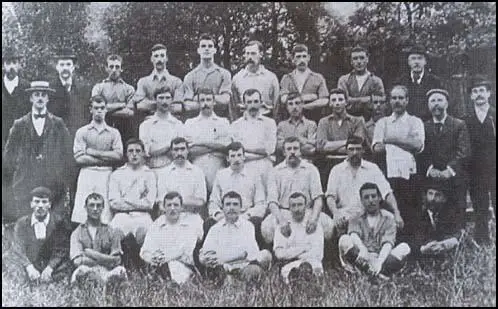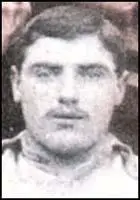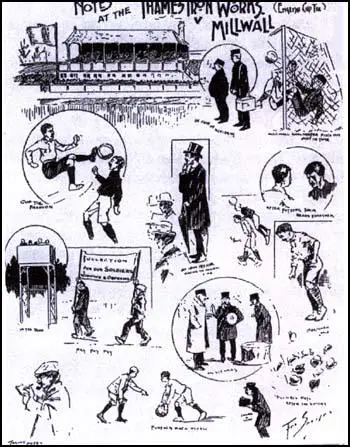The History of West Ham United
1899-1900
Francis Payne, the club secretary, was given the task of finding good players for Thames Iron Works first season in the top division of the Southern League. According to one report, Arnold Hills, gave Payne £1,000 to find the best players available.
Payne employed an agent and former professional footballer named Charles Bunyan to obtain a player based in Birmingham. Bunyan missed his appointment with the player targeted by Payne. He then approached another player he thought might be interested in joining the club. However, this player reported Bunyan to the Football Association. The FA held an investigation into the matter and as a result, Bunyan was suspended for two years. Payne was also suspended and the Thames Iron Works was fined £25.
In 1900 the Football League introduced a maximum wage of £4 per week.This was double what a skilled tradesmen received at this time. At the same meeting they also voted to outlaw match bonuses. To encourage men to play for clubs for several years, players were to be awarded a benefit after five years. This was an attempt the curb the power of the wealthier clubs. For example, some of West Ham's London rivals had far higher attendances. During the early 1900s Chelsea and Spurs had an average of around 30,000 people watch their home games.
George Neil became the new secretary/manager. He immediately made three important signings from Tottenham Hotspur: Tom Bradshaw, Bill Joyce and Ken McKay. Initially, Arnold Hills, refused to sanction the transfers because he claimed the club could not afford them, but he eventually relented. Bradshaw who played on the left-wing for England against Ireland in 1897, whereas Joyce and McKay had done well in Scotland before moving south.
Albert Carnelly, a talented inside forward, was signed from Bristol City. Payne also signed Charles Craig from Dundee and Syd King from New Brompton (Gillingham). King was considered to be the best full back in the Southern League and Derby County, one of the best teams in England, challenged Thames Iron Works for his signature.

H. Sunderland, Henry Gilmore, F. Adams. Second row: Fred Corbett, Charlie Dove,
Tommy Dunn, Syd King, James Bigden, L. Foss, M. Higham, Sam Wright (trainer).
Seated; W. James, Ken McKay, Tommy Moore, Albert Carnelly, Tom Bradshaw.
Front; J. Walker, Peter McManus, Bill Joyce, Roderick McEachrane, Simon Chisholm.
All the top clubs at that time had a large number of Scots in the team. The Pastime Magazine write: "The spectator does not care, whether his team or village team is composed of bona fide natives ior Scotchmen hired from afar. Provided that they win their matches, he is well satisfied."
At the beginning of the 1899-1900 season, the Irons had ten Scots in their squade: Bill Joyce, Ken McKay, Tommy Dunn, Peter McManus, Roderick McEachrane, Jimmy Reid, William Stewart, Simon Chisholm, Tommy McEwan, George Reid, Patrick Leonard and Robert Allan.
George Neil also replaced George Radcliffe with Sam Wright as trainer. It is believed that Wright was recommended by Syd King who had worked with him at New Brompton. Radcliffe became Wright's assistant.
As the Irons were now in the top league it was decided to increase season ticket prices. It was now 10s. 6d (52.5p) for the grandstand and 7s. 6d. (37.5p) for the rest of the ground. The first home game was against Chatham. The attendance of 1,000 was lower than most games the previous season and was probably a reaction to the price rise.
The Irons team that day was: Tommy Moore, Tommy Dunn, Charlie Dove, Peter McManus, Roderick McEachrane, Fred Corbett, Ken McKay, Bill Joyce, Albert Carnelly, and Tom Bradshaw. They won the game 4-0 with Carnelly and McKay both scoring a couple of two goals.
The next two games were in the FA Cup and both ended in easy victories. They beat Royal Engineers 6-0 and Grays United 4-0. This was followed by a 1-0 league victory against Brighton United. These four victories encouraged local supporters to see the next home game against league leaders, Bedminister. The Irons won the game with a Bill Joyce penalty.
Hammers good form continued when the beat Dartford 7-0 in the next round of the F.A. Cup (Albert Carnelly 2, Ken McKay 2, Bill Joyce, Roderick McEachrane, Tom Bradshaw). The new signings were doing especially well and the Irons were accused of buying success. This is what a Dartford newspaper had to say about the game: "No one was greatly surprised at the 7-0 result. In these days the banking account has to be considered and the luxury of passing into the next round with little effort has proved an expensive one to the Ironworks. No more than 1400 were present and roughly speaking £30 was taken at the gate. Consequently the Thames share does not reach the wages bill, quite apart from the other expenses."
The reporter went on to praise the quality of the performance: "The Irons played the passing game with quick and accurate exchanges and there was no time to stop their defence which was on the Dartford men in a second... That the Works were far more superior is beyond all doubt."
The first big game for the Irons was an away against their long-time rivals, Tottenham Hotspur. The club organized "horse brakes and buses" to take supporters from Canning Town to White Hart Lane. The 7,000 crowd watched the Irons take a 7-0 beating. The game was at first fairly even but Tommy Dunn "ricked his hip" and was forced to leave the field. Tommy Moore sustained a "serious injury to thumb", Peter McManus ("knee badly cut") and Bill Joyce ("three deep wounds on the right knee") were also injured. At a time where substitutes were not allowed, the Irons were down to 7 fit men.
It was the turning point of the season. The Irons lost 8 of their next 10 games. Several regulars missed games with injuries, including Tommy Dunn, Peter McManus and Bill Joyce. Tom Bradshaw who had started the season so well, and was captain of the team, was taken ill and died of consumption on Christmas Day 1899. However, one close friend was convinced that he died as a result of a kick to the head he had received while playing for Liverpool. Bradshaw complained that he suffered terrible pains when he headed the ball. Bradshaw, who was only 26 years old, left a widow and two young children.

Four day's after Bradshaw's death the Irons played QPR at the Memorial Grounds. Once again the home side lost. The local newspaper reported that the fans did what they could to encourage the Hammers: "At intervals during the game a chorus of about twenty voices felt it a duty to jerk - I say "jerk" advisedly - out some encouragement to this effect: "Pl-a-a-y up I-I-ron-wor-ks". The voices were the nearest approach to that of a foghorn I have ever heard on the mainland. Such a distracting row, surely, was never intended to help our fellows on."
The Irons were also knocked out of the FA Cup by Millwall. 13,000, the largest crowd of the season at the Memorial Grounds, watched Millwall win 2-1. The local newspaper criticized the home fans for not being as vocal as the visitors. The reporter suggested that the Millwall supporters "must have had cast iron lungs as they were shouting all afternoon".

Millwall also beat the Irons 2-0 at the Memorial Grounds in the league. This time there was 12,000 to see the match. However, Thames Iron Works did get revenge in the return game, with Ken McKay scoring the only goal of the game.
Thames Iron Works finished second from bottom in the league that season. They therefore had to play a Test Match (play-off) against Fulham, who had finished as runners-up in the Second Division. Bill Joyce scored a hat-trick in the Irons 5-1 win.
The club's new signings had a good season. Bill Joyce scored 18 goals in all competitions. Albert Carnelly got 14 and Ken McKay finished third in the list with 13. These three men were responsible for 24 of the goals scored that season in the league. However, the other players contributed only six and 30 goals in a season was just not good enough. For example, the champions that year, Tottenham Hotspur, scored 67 goals.
